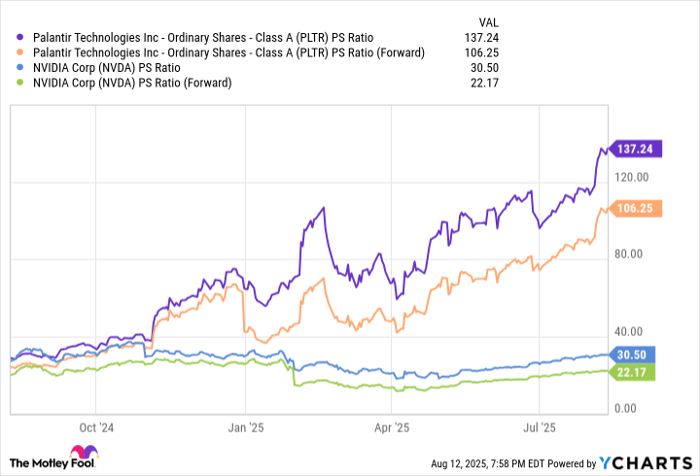Better Technology Stock: Nvidia vs. Palantir

Key Points
Nvidia is now the most valuable publicly traded company in the world, and all signs point to another great earnings report this month.
Palantir Technologies is the fastest-growing company in the S&P 500.
Semiconductor giant Nvidia (NASDAQ: NVDA) and artificial intelligence (AI) kingpin Palantir Technologies (NASDAQ: PLTR) are two of the most compelling technology stocks in the market. Nvidia harnessed demand for its graphics processing units (GPUs) to become the biggest company in the world, with a $4.4 trillion market capitalization. Palantir, meanwhile, is using its artificial intelligence platform to fundamentally change how governments and commercial businesses operate. The stock is up more than 500% in the last year and is the best-performing stock in the S&P 500.
In my view, you can't go wrong with either of these tech stocks. But in a one-on-one matchup, which comes out on top?
Where to invest $1,000 right now? Our analyst team just revealed what they believe are the 10 best stocks to buy right now. Learn More »
Let's look at both companies before rendering a verdict.

Image source: Getty Images.
Nvidia
Nvidia's GPUs are the engine behind this mammoth company. While they used to be best known for providing the graphics in computers, now GPUs are commonly used by companies that are building massive data centers to run artificial intelligence-powered platforms, including large language models needed for generative AI.
Nvidia has the lion's share of this business, with Jon Peddie Research estimating that it has roughly 92% of the market share. And as Nvidia is expecting spending on data centers to accelerate from $250 billion in 2023 to $1 trillion annually by 2028, there's a massive opportunity at hand.
In addition, major tech companies like Microsoft, Alphabet, and Meta Platforms are spending heavily and are even increasing their capital expenditure spending on their data centers. That's why I'm expecting a solid earnings report from Nvidia when it reports its earnings for the current quarter, and why I'm expecting the stock to pop yet again after the numbers are released.
Palantir Technologies
Palantir got its start a little more than 20 years ago as a data mining company to provide real-time analytics and insights. As a government contractor, it's long been valued by the military for its analytic technology that helps commanders make real-time decisions in battle. To the public eye, Palantir largely flew under the radar for years until in 2011, when it was credited for helping U.S. forces find and eliminate Sept. 11 mastermind Osama bin Laden.
Palantir works by drawing information from many sources, such as satellite imagery. By sifting through and digesting that information, it can perform instantaneous analysis that can help governments function. According to its CEO, Alex Karp, "Palantir was founded on the belief that the United States, its allies, and partners should harness the most advanced technical capabilities for their defense and prosperity."
As its capabilities expanded through the launch of its generative AI-powered Artificial Intelligence Platform (AIP), Palantir is quickly bringing in additional non-military government contracts. It has new contracts with the Federal Aviation Administration, the Centers for Disease Control and Prevention, the State Department, and the Internal Revenue Service. In the company's just-released second quarter earnings report, U.S. government revenue increased 53% in the last year, reaching $426 million.
Commercial revenue is growing even faster, up 93% in the second quarter on a year-over-year basis and reaching $306 million. Clients include Walgreens Boots Alliance, AT&T, General Mills, United Airlines, and others, and Palantir is doing everything from making manufacturing more efficient to managing supply chains and helping companies scale.
Palantir closed 157 deals in the second quarter valued at more than $1 million, with 66 of them more than $5 million and 42 of them at least $10 million. As more companies bring Palantir's platform online and share how they are improving their businesses, Palantir's platform will become a must-have for many institutions.
The verdict
I'm not gonna lie. This is a tough one. I love both of these companies, and I think both are destined to increase.
But if I have to choose one, then the valuations of both companies will break the tie. At the time of this writing, Nvidia is richly valued both in its price-to-earnings (P/E) ratio of 59 and its forward P/E of 42, but Palantir comes in at an unhealthy 623 and 288, respectively.
The price-to-sales ratio, which compares market capitalization to revenue, is arguably an even more accurate measurement as both of these companies are pouring profits back into the business. And Nvidia is by far the strongest there, too.
PLTR PS Ratio data by YCharts
So, my winner in this hypothetical battle is Nvidia by a nose. But both stocks are great ones to have, and they'll both anchor my portfolio for the foreseeable future.
Should you invest $1,000 in Nvidia right now?
Before you buy stock in Nvidia, consider this:
The Motley Fool Stock Advisor analyst team just identified what they believe are the 10 best stocks for investors to buy now… and Nvidia wasn’t one of them. The 10 stocks that made the cut could produce monster returns in the coming years.
Consider when Netflix made this list on December 17, 2004... if you invested $1,000 at the time of our recommendation, you’d have $668,155!* Or when Nvidia made this list on April 15, 2005... if you invested $1,000 at the time of our recommendation, you’d have $1,106,071!*
Now, it’s worth noting Stock Advisor’s total average return is 1,070% — a market-crushing outperformance compared to 184% for the S&P 500. Don’t miss out on the latest top 10 list, available when you join Stock Advisor.
*Stock Advisor returns as of August 13, 2025
Patrick Sanders has positions in Nvidia and Palantir Technologies. The Motley Fool has positions in and recommends Alphabet, Meta Platforms, Microsoft, Nvidia, and Palantir Technologies. The Motley Fool recommends the following options: long January 2026 $395 calls on Microsoft and short January 2026 $405 calls on Microsoft. The Motley Fool has a disclosure policy.








